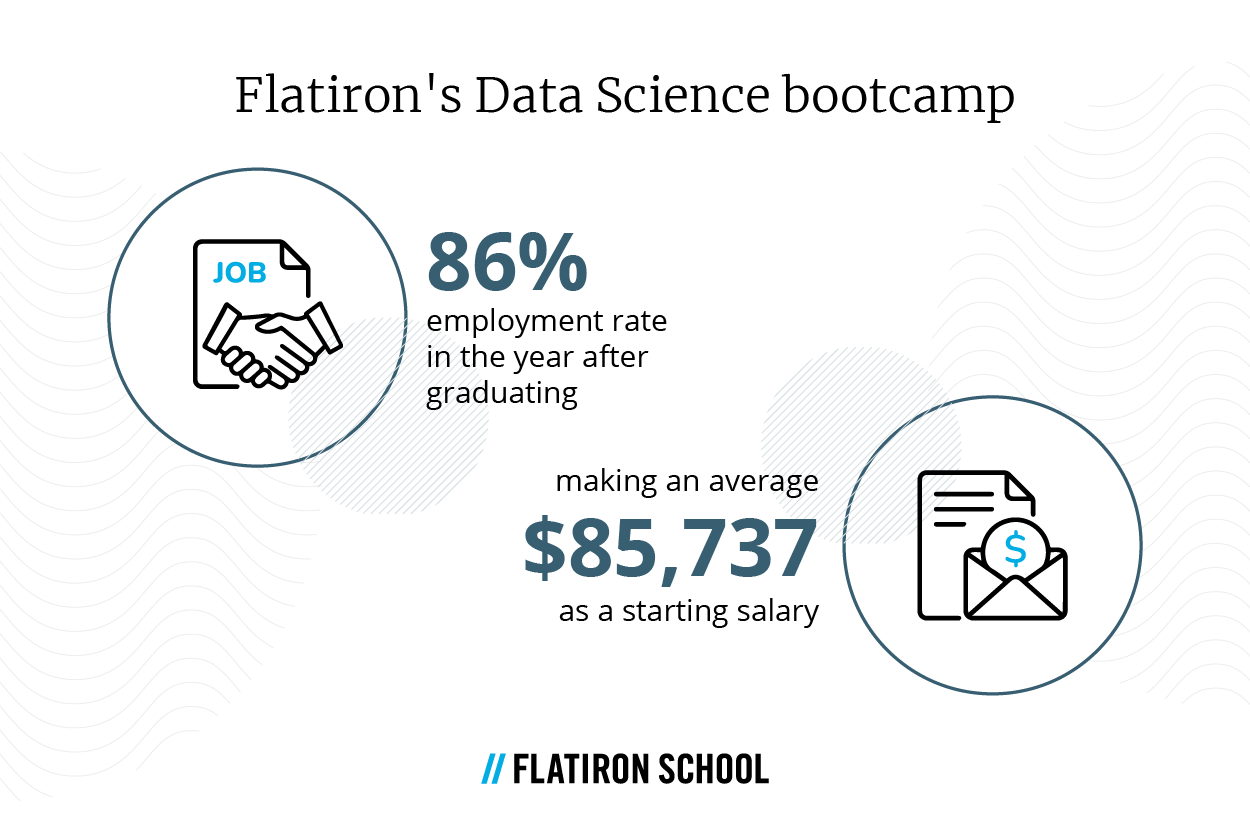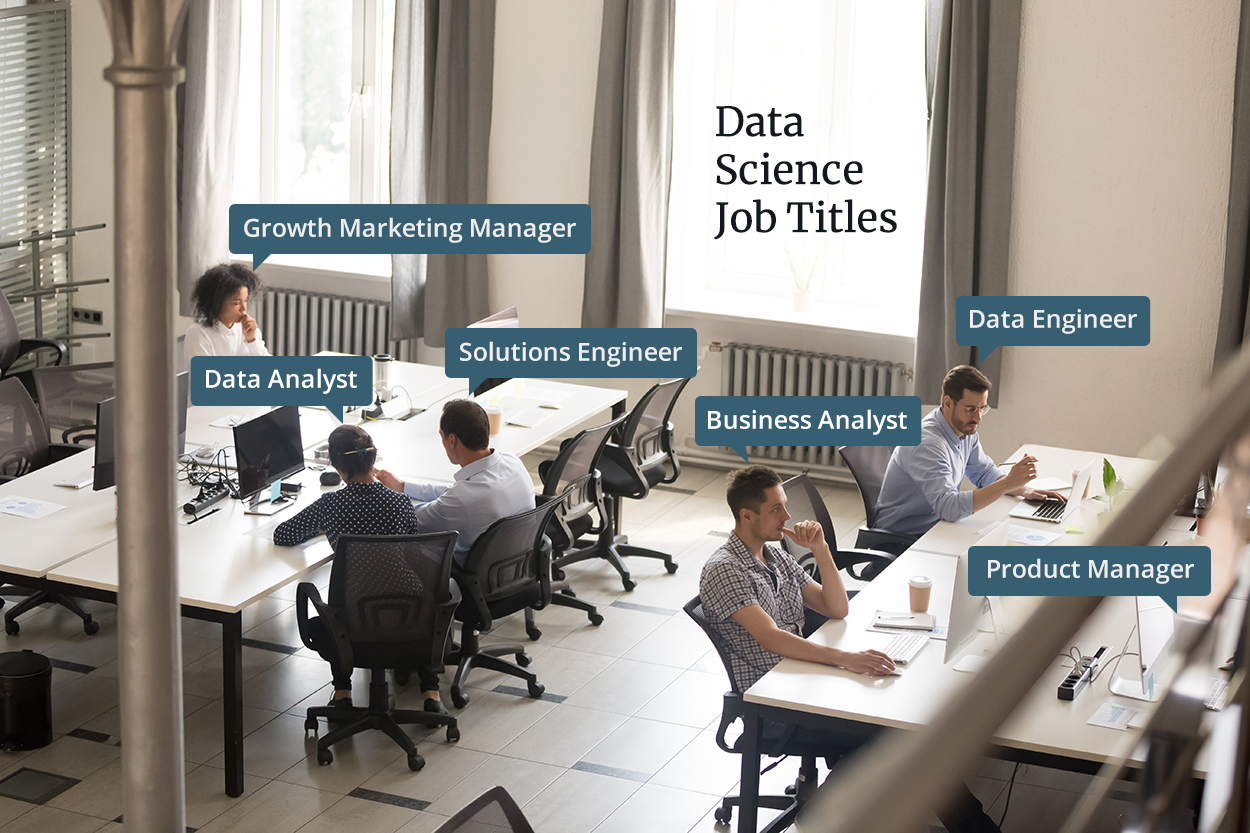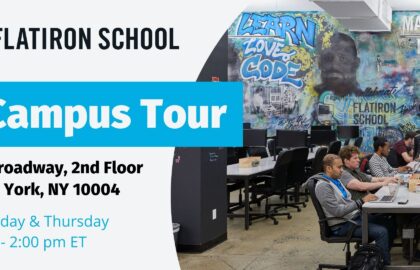
You’ve already made up your mind. You’re ready to change careers and pursue data science. But going back to school for a master’s degree is a huge expense—both in terms of tuition and the fact that you won’t be able to bring in much of an income while you study. You’re sure you want to pursue this career path, but you just don’t know how to make graduate school work.
But when you look at job postings for your dream jobs, they all seem to require a master’s degree. You’re left wondering: is there any way to enter the data science field without getting a master’s?
The answer is simple: absolutely. And we have plenty of proof to back that up.

Graduates of Flatiron School’s Data Science bootcamp have an 86%* employment rate in the year after graduating. And that’s not for low-level jobs that barely pay—they make an average of $85,737** as a starting salary. All of that’s possible without a master’s degree, no matter what those job ads say.
**for job-seeking on-campus graduates included in the 2020 Jobs Report including full-time salaried roles, full-time contract, internship, apprenticeship, and freelance roles, and part-time roles during the reporting period (see full Jobs Report here).
**For job-seeking students who accepted full-time salaried jobs during the reporting period and disclosed their compensation. The average starting salary for students who took full-time contract, internship, apprenticeship, or freelance roles and disclosed compensation was $39/hr. Average pay for a part-time role was $26/hr (see full Jobs Report report here).
Job postings aren’t the only (or best) way to get a data science job
The main reason most aspiring data scientists worry about needing a master’s degree is because of seeing job posts that say so. But for anyone pursuing a career in data science, you should know that job posts are not the best path to find your dream job.
They’re one tool you can use, but long gone are the days where job searching meant finding a job description, applying, and sitting back to wait. Today, you’re more likely to find the perfect job through connections with other people in your field. Getting to know other professionals working in data science and looking for ways to directly interact with prospective employers is much more likely to lead to success.
At Flatiron School, we recommend students take a more strategic approach to looking for jobs. Create a targeted job search plan. Decide the types of companies you want to work for, industries you want to work in, and the technology, tools, and skill sets you want to focus on in your work. Then you can proactively seek out the jobs you want, rather than hoping someone will pick your application from a (virtual) pile.
Why you shouldn’t stop reading at the list of job requirements
While job ads aren’t typically the best way to find a new job, they do have their place in the job search. But when reviewing a job ad, too many people scan the list of requirements, see something that doesn’t apply to them, and figure they don’t have a chance. Instead, read the entire job description.
When you read through the whole thing carefully and thoroughly, you’ll find helpful information about what the company is really looking for.
Even if you don’t meet all the “requirements,” you may have exactly the mix of skills and experience they need.
Maybe you have relevant industry experience and samples of projects you’ve done with the main types of tech they use. If you can make a case to the right person for why you’re perfect for the job, what degrees you do or don’t have won’t matter much.
Data science jobs don’t begin and end at data scientists.
When researching the prospects of a data science career, many people naturally start looking up information on Data Scientist jobs. It’s the most obvious job title to consider in the data science field. But understanding data science leads to far more career options than just data scientist positions.
Someone with experience and knowledge of data science might find their perfect role under the title business analyst, solutions engineer, data analyst, growth marketing manager, product manager, or data engineer—just to name a few of the many options. Data science is a skill set that can be integrated into a wide range of job types across many industries. And a lot of job posts for these roles won’t even claim to require a master’s.

For many businesses, experience and initiative are worth more than a degree.
A master’s degree is meant to convey a certain amount of knowledge and experience in the field. That’s what those hiring managers are looking for when they list it on a job post. But going to grad school for data science isn’t the only way to gain relevant experience.
A good data science bootcamp provides the basis of knowledge you need to form a strong foundation, and will assign you the kind of hands-on projects that ensure you understand data science in practice, not just theory.
At Flatiron School, we don’t just teach students about the topics they sign up to learn. We emphasize the importance of learning the skill of how to learn. In any tech field, what you learn in a master’s program could be out of date in five years (or less). But learning how to constantly be seeking out new information, taking on new projects, and picking up new coding languages—that equips people with the skills they need to build a sustainable career over the long term.
During the job search, that translates to students taking the initiative to practice as they search. They refine and tweak the projects they completed during the program, and set to work building new things at the same time. They post projects on LinkedIn and Github, or get involved in hackathons and open source projects.
And it works. Through this kind of ongoing learning, they build up impressive portfolios that show companies how valuable they’ll be to their workforce.
They catch the attention of CEOs and hiring managers due to their combo of hard skills and personal drive — that’s more important to job success than any piece of paper.
They take on internships or volunteer with organizations whose missions they care about, then find those opportunities turning into full-time work. The paths students take vary, but the result is typically the same: master’s degree or not, they find lucrative jobs.
How a (good) bootcamp gets your foot in the door.
The main job of a data science bootcamp is to make sure you graduate with a solid base of skills and knowledge in data science. But a good program will go further than that and make sure you can translate what you learn into the career you want.
Flatiron School has career coaches that help students bridge that gap. The coaches help students figure out what kind of jobs they truly want, so they can actively look for the businesses and positions that will make them happy. They help them figure out what job titles to look for, and how to read between the lines in a job description to understand what the company really values. And they help them develop strategies to meet and impress the right people—the ones who have hiring power.
Having a master’s degree is ultimately less powerful than knowing how to craft a successful job search strategy. One that prioritizes finding work you want to do at a company you want to work for, then making it happen.
Ready to change your career with a bootcamp?
Apply to Flatiron School today or schedule a 10-minute chat with admissions to learn more.




